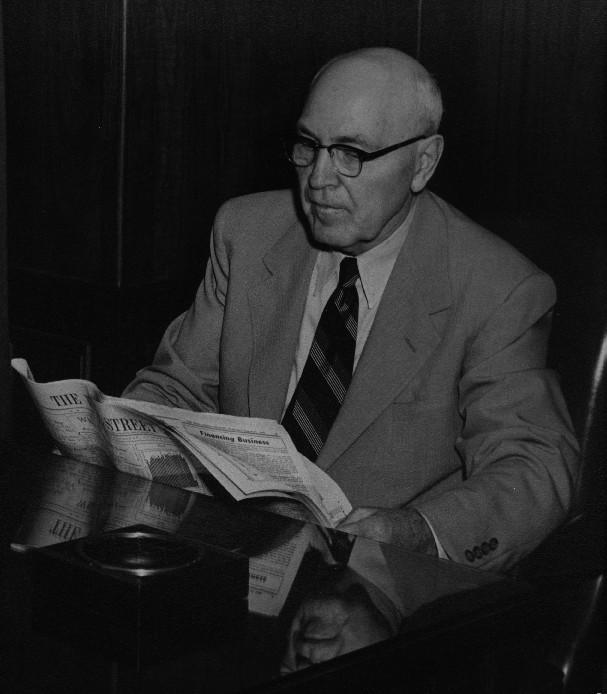 |
Howard Paul
9/8/1889 2/16/1960 |
 |
 |
Howard Paul
9/8/1889 2/16/1960 |
 |
Banker, Rancher, Farmer and Early Cattle Feeder
 |
John Howard Paul was born September 8, 1889, in Panhandle, Texas, in his parents James Christopher Paul and Nina Darby Paul's apartment over the first bank organized on the High Plains. This event led his father to call Howard a "natural born banker" and his life proved this true. His birth was also one of the first in the newly organized county of Carson. |
Howard and his elder brother, Frank Allan Paul, lost their mother on December 27, 1892. She was buried in Nunda, Illinois. They moved to their father's farm, two and a half miles south of Panhandle, where they lived with Mr. and Mrs. John Lill and their children for seven years. Later, they went away to boarding school (Fishburn Military Academy in Virginia, Morgan Park Military Academy in Illinois and the University of Chicago), but still spent their summers with the Lill family working on the farm. During one summer, Howard worked for a survey gang, plotting the boundaries and section lines of the White Deer Land and Cattle Co.
In June, 1911, Judge Paul and Howard charted the Paul Bank in Slaton, Texas, as a private bank. In 1917, the bank became the Slaton State Bank. Howard laughingly recalled that in the early days of this bank, he made loans; kept the books; and swept out the building--filling all of the positions from president to janitor.
Howard married Maggie Malinda Cleek, daughter of Samuel and Mary Isabelle Cleek on October 16, 1912. They had a son, John Cleek (JC) Paul, on August 17, 1913, and twin girls, Mary and Margaret, on December 7, 1919.
In 1917, Howard sold the Slaton Bank. During the war, Howard operated the Panhandle Bank for his father and brother. In December, 1919, he moved to Amarillo and purchased an interest in the Guarantee State Bank and became Vice President.
|
|
Margaret Paul died at the age of six months and two years later, Howard's twenty-six year old wife, Maggie, died, leaving J.C. and Mary without a mother, just as Howard and Frank had been left motherless. A friend of the family, "Auntie Brown" helped raise the children. |
Howard purchased control of Guaranty State in 1928 and became President. This bank later became the American State Bank and, in 1936, received a Federal Charter, becoming The American National Bank.
Howard and his brother Frank had been involved in ranching and farming since 1911, when they purchased a ranch in Bailey and Lamb County, south of Muleshoe, Texas, from their father. Judge Paul had purchased the Circle-back Division from the XIT Ranch. The ranch became known as the Paul Brothers Ranch, using the Tumbling T brand. During the thirties, the Paul brothers were among the pioneers in trench silo feeding of livestock and were reputed to be the first to introduce full-fed cattle and sheep feeding in the Panhandle. In 1938, they had 2,000 steers and 20,000 lambs in the feed lots.
| Will and Exie O'Brien joined John and Mary O'Brien with their new son Bill and Ludie and Howard Paul in 1943 in the Paul home. This was the first grandson for both sets of grandparents. |
Howard had a great interest and derived much pleasure from operating the ranch. It provided the perfect balance for the dedicated banker with its outdoor life and outside interest.
|
|
Aunt Mattie Helen, Frank Paul, Sr., Ludie and Howard Paul in front of the Paul home in 1944. Ludie and Howard were married in 1940. |
Howard Paul worked with the Panhandle Bankers Association actively for many year and with the Bankers Associations throughout the United States. In May, 1954, "The Texas Bankers Record" said:
It shows a stalwart of the upper Plains country, spelled with a capital P.--a sturdy product of the Amarillo sector, he has spent most of his business life in banks thereabouts. He is Howard Paul of the American National Bank of the Potter County capitol...He was its president and a go-getter in those years immediately following World War II. His father was the late Judge Paul, the patron of all things good and progressive in the vicinity of the city of Panhandle. All of his adult life until a few years ago, Howard Paul was a great, outdoor, going sort of man: ranching, riding, hunting, golfing, convention-going and so on. In later years, he has been kept closer to taw by a thigh bone break, which has given trouble. Yet, today, Howard preserves his jolly disposition, his bright outlook, his friendly eye-sparkle... Howard, although using a cane, is still very active in the management of his bank, putting in time very day at his desk. Oh yes--today his hair remains the same long, curly variety as is shown in the photograph.
The last quip referred to the fact that Howard was bald almost as long as anyone could remember. The fall that broke Howard's thigh happened when he was sleepwalking. He fell down a flight of stairs. Unfortunately, the broken bone was not the heart of his problem. He had Parkinson's Disease and slowly lost mobility.
John and Howard in the late '50's.
The board of the American National Bank: Newton Harrell, B.M. Brittain, John O'Brien, Frank Paul Sr, Raymond Henry, Frank Paul, Jr., Mr. Ordway, Floyd Studor and Howard Paul
Howard helped organize the Rotary Club of Amarillo and later was President of the organization. A club resolution after Paul's death on February 16, 1960, told much about the banker:
--to J. Howard Paul and to honor the memory of a man who had measured up to the highest ideals of a Christian gentleman.
He served on the Board of Elders of the First Presbyterian Church from 1924 to 1952 and took a leading role in the building of the lovely building which now stands at Eleventh and Harrison. He was intensely interested in the Presbyterian Children's Home and served as treasurer for many years. During the campaign to raise funds for construction of the Y.W.C.A. a few years ago, he said, "An investment in youth is the only investment that really lives throughout all generations.
In the passing of Rotarian Howard Paul, Rotary has lost a member who truly exemplified its teachings in his personal life and Amarillo and the Panhandle of Texas have lost a citizen who will be remembered for the fine and worthy contributions made by him in the life of this community.